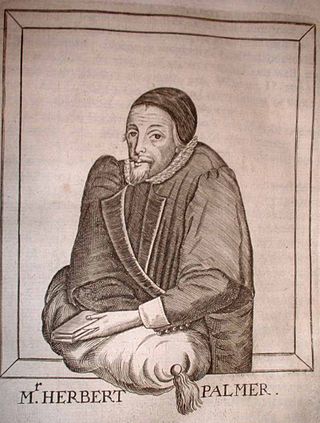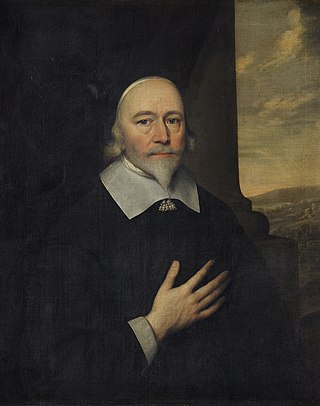
Simeon Ashe or Ash (died 1662) was an English nonconformist clergyman, a member of the Westminster Assembly and chaplain to the Parliamentary leader Edward Montagu, 2nd Earl of Manchester.

Simeon Ashe or Ash (died 1662) was an English nonconformist clergyman, a member of the Westminster Assembly and chaplain to the Parliamentary leader Edward Montagu, 2nd Earl of Manchester.
He was educated at Emmanuel College, Cambridge. [1] He began his career as minister in Staffordshire, but was ejected from his living on account of his refusal to read the Book of Sports and to conform to other ceremonies. On his dismissal Sir John Burgoyne befriended him and allowed him the use of an 'exempt' church at Wroxhall; and he was afterwards under the protection of Robert Greville, 2nd Baron Brooke. He was a regular Sunday preacher at Warwick Castle, and friend of Thomas Dugard. [2]
When the First English Civil War broke out, he became chaplain to the Earl of Manchester. At the close of the war he received the living of St. Austin, and was also one of the Cornhill lecturers. He was nominated to the Westminster assembly after the death in 1643 of Josias Shute. [3]
Although he had joined the side of the parliament, Ashe was strongly opposed to the extreme party of the Cromwellians; and when the time was ripe for the English Restoration he was among the divines who went to Breda to meet Charles II of England. He died a few days before the passing of the Act of Uniformity, and was buried on 24 August 1662. Had he lived to see the passing of the act, he would have vacated his living. Ashe was a man of some property, and while he held the living of St. Austin, his house was always open to his clerical brethren. Walker charges him with exercising severity against the conforming clergy.
In 1644 he joined with William Goode, another chaplain of the Earl of Manchester, in writing a pamphlet entitled A particular Relation of the most Remarkable Occurrences from the United Forces in the North. This was followed by another pamphlet, for which Ashe alone was responsible, entitled A True Relation of the most Chiefe Occurrences at and since the late Battell at Newbery. The writer's object in both cases was to vindicate the conduct of his patron. In John Vicars's Parliamentary Chronicle there is a letter of his, describing the proceedings of the Earl of Manchester in reducing several garrisons after the battle of Marston Moor.
Ashe was the author of sermons, including
He also edited some treatises of John Ball, John Brinsley, Ralph Robinson, and others.

Thomas Fuller was an English churchman and historian. He is now remembered for his writings, particularly his Worthies of England, published in 1662, after his death. He was a prolific author, and one of the first English writers able to live by his pen.
Stephen Marshall was an English Nonconformist churchman. His sermons, especially that on the death of John Pym in 1643, reveal eloquence and fervour. The only "systematic" work he published was A Defence of Infant Baptism, against John Tombes (1646).
Francis Cheynell (1608–1665) was a prominent English religious controversialist, of Presbyterian views, and President of St John's College, Oxford 1648 to 1650, imposed by the Parliamentary regime.
Anthony Burges or Burgess was a Nonconformist English clergyman, a prolific preacher and writer.
Griffith Williams (c.1589–1672) was the Anglican bishop of Ossory. He was opposed to the Puritans.

Benjamin Lany was an English academic and bishop.
Lazarus Seaman, was an English clergyman, supporter in the Westminster Assembly of the Presbyterian party, intruded Master of Peterhouse, Cambridge, and nonconformist minister.

Herbert Palmer (1601–1647) was an English Puritan clergyman, member of the Westminster Assembly, and President of Queens' College, Cambridge. He is now remembered for his work on the Westminster Shorter Catechism, and as a leading opponent of John Milton's divorce tracts.

John Butler (1717–1802) was an English bishop and controversialist.

Obadiah Sedgwick (1600?–1658) was an English clergyman of presbyterian views, and a member of the Westminster Assembly.
Thomas Westfield was an English churchman, Bishop of Bristol and member of the Westminster Assembly.
Dr. Calybute Downing (1606–1643) was an English clergyman, a member of the Westminster Assembly. Also a civil lawyer, he is now remembered for political views, which moved from an absolutist position in the 1630s to a justification of resistance to authority by 1640, within a contractarian setting.

Richard Love (1596–1661) was an English churchman and academic, Master of Corpus Christi College, Cambridge, Lady Margaret's Professor of Divinity, member of the Westminster Assembly, and Dean of Ely.

William Nicholson was an English clergyman, a member of the Westminster Assembly and Bishop of Gloucester.

Isaac Bargrave was an English royalist churchman, Dean of Canterbury from 1625 to 1643.

Nicholas Lockyer (1611–1685) was an English clergyman and Independent minister, a close supporter of Oliver Cromwell and Provost of Eton College, and later an ejected minister and nonconformist.
Edward Reyner (Rayner) (1600–c.1668) was an English nonconforming clergyman, known as a devotional writer.
John Shawe or Shaw (1608–1672) was an English Puritan minister, an influential preacher in the north of England during the Interregnum.
Edward Bowles (1613-1662) was an English presbyterian minister.

Thomas Jacomb (1622–1687) was an English ejected minister.
![]() This article incorporates text from a publication now in the public domain : "Ashe, Simeon". Dictionary of National Biography . London: Smith, Elder & Co. 1885–1900.
This article incorporates text from a publication now in the public domain : "Ashe, Simeon". Dictionary of National Biography . London: Smith, Elder & Co. 1885–1900.